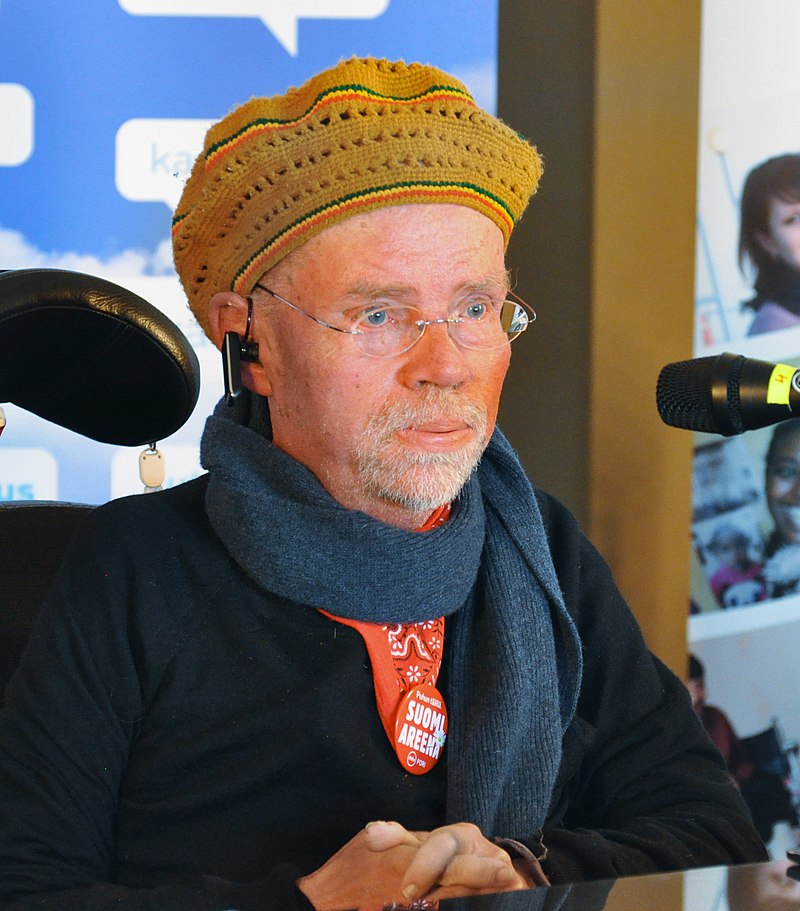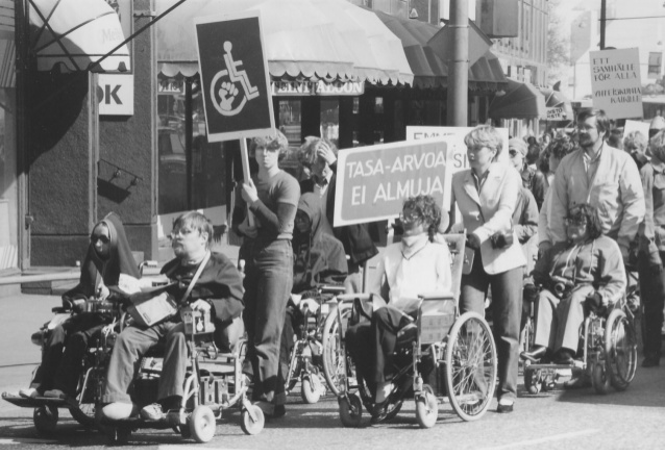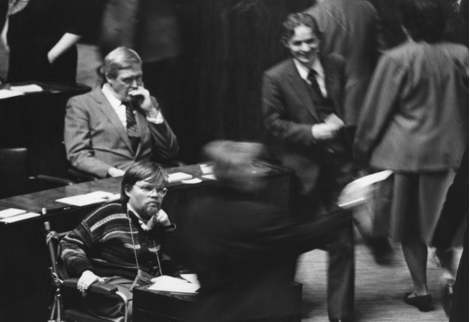Kalle Könkkölä (1950-2018)
Kalle Kustaa Topias Könkkölä was an environmental activist, politician and key figure of the Finnish disability rights movement. Having been physically disabled since birth, Könkkölä attracted nationwide attention when he was elected as one of the first members of the Finnish parliament for the then still young environmental movement in 1983 - which also made him the first MP with a disability. Today, Könkkölä is mostly known for his longstanding commitment to the promotion of disability rights, including his role in initiating the first Finnish disability organization with a human rights approach, the Threshold Association in 1973, as well as supporting people with disabilities in developing countries and humanitarian contexts.

Becoming an activist
Born in Helsinki in 1950, Kalle Könkkölä had multiple disabilities and started to use a wheelchair early in his life. While pursuing a Bachelor's degree in mathematics at the University of Helsinki, he became involved in student politics. In 1973 he and other disabled students founded the disability rights organization the Threshold Association (Kynnys ry), of which he became a long-term chairman. Inspired by the international student movement and other civil rights activism, the organization raised public attention as it rallied its members to stage protest marches and demonstrations to voice their political demands. One year after founding Threshold, Könkkölä also took over as chairman of the Union of Tuberculosis and Pulmonary Impairment Patients (Tuberkuloosi- ja Keuhkovammaisten Liitto, since 2012 Hengitysliitto), a position he held until 1997.
In the years following his graduation in 1974, Könkkölä also became a campaigner for socio-ecological ideas and was co-founder of the Helsinki Movement, a key organization in the emerging environmental movement.
The goals of the movement reflected both Könkkölä’s individual experiences as a disabled person and his broader societal and political interests, namely, to find alternatives to contemporary approaches to urban planning, including the dominance of the car over housing and quality of life, often inaccessible public spaces, and the demolition of historical buildings in the center of Helsinki.
PICTURE: Demonstration of the Threshold Association (Kynnys ry) in Helsinki in the 1970s, with Könkkölä in the front row. Photo: Kynnys ry.
A disabled green politician: Political career in Helsinki and the Finnish parliament
In pursuing his goals to instigate changes in urban planning and accessibility, Könkkölä became a member of the Helsinki City Disability Advisory Board in 1980, a post he held until 1984 and again from 1989 to 1990. In the early 1980s, the Helsinki Movement merged with other environmentalist and politically alternative groups to form the Finnish Green League (Vihreä liitto). In the general elections in 1983, the movement gained two seats – one by Könkkölä, which made him not only one of the first green parliamentarians, but also the first Finnish MP with a disability. This attracted considerable public attention, increased by the fact that parliament initially denied him the personal assistance needed to properly execute his political work and even asked him to move into a sheltered institution. Threshold and other disability organizations as well as several media outlets sharply criticized this reaction as paternalistic and discriminatory, accusing the political establishment of gross ignorance of the reality of disabled people’s lives. Könkkölä eventually brought the matter before the administrative court and won the case, setting an important precedent. He held his parliamentary seat until 1987, but continued thereafter to serve the Green League as chairman (1987-1990) and vice-chairman (1990-1991).
PICTURE: Kalle Könkkölä (front) as MP of the Green League at the Finnish Parliament, 1983. Photo: Kynnys ry.
Municipal politics was another field of action for Könkkölä, who was a member of the Helsinki City Council from 1985 to 2004. He also held seats on the board of Helsinki University Central Hospital (1985-1997), the Helsinki Social Welfare Board (1989-1992), as well as serving as chairman of the Helsinki Health Board from 1993.
International disability rights
In the mid-1970s Könkkölä undertook several study trips to North America, the Netherlands, Denmark and Sweden, where he met with local representatives of disability organizations. Between 1979 and 1981 he represented Threshold and other Finnish disability organizations in the Finnish Committee for the United Nations International Year of Disabled Persons (IYDP). It is partly attributable to this involvement that the Finnish IYDP not only focused on more traditional topics like rehabilitation and welfare support, but also addressed the inclusion of self-advocacy groups, disability rights and political responsibilities.
Könkkölä also campaigned for the rights of disabled people on an international level. Between 1986 and 1993 he advised the European Community on disability policy issues and played an important role as chairman (1990-1998) and Finnish committee chairman (1991-1994) for the transnational self-advocacy organization Disabled People’s International (DPI). From 1991 onward he was a consulting expert on disability issues to the United Nations, and a member of the UN Disability Council from 2000 to 2007. In 1998 he founded and chaired the Abilis Foundation, a non-governmental organization that supports persons with disabilities in underdeveloped countries and critical humanitarian situations, and continued to play a pivotal role in it until dying of pneumonia in 2018.
Kalle Könkkölä undeniably holds a special position in modern Finnish history, thanks to his diverse and long-standing activities in politics and human rights organizations. He has not only been at the forefront of the Finnish disability rights movement since its inception in the early 1970s, but also made disability-related issues compatible with broader political and civil society debates. Similar conclusions can be drawn as to his involvement in the formative years of the environmental movement. Even if his career as a member of parliament only lasted four years, he is remembered for his charismatic commitment to disability rights promotion, both in Finland and worldwide.
Further reading:
- Kalle Könkkölä, Coming into the Light. Finnish Disabled People Speak Up. (Helsinki: Threshold, 1989).
- Kalle Könkkölä and Heini Saraste, The World Became My Room. Part II. (Porvoo, Helsinki, Juva: WSOY, 2014).
- Heli Leppälä, 'Duty to Entitlement: Work and Citizenship in the Finnish Post-War Disability Policy, early 1940s to 1970.' Social History of Medicine, 27,1 (2014) pp. 114-164.
- Heli Leppälä, Vammaisuus hyvinvointivaltiossa. Invalideiksi, vajaamielisiksi tai kehitysvammaisiksi määriteltyjen kansalaisasema suomalaisessa vammaispolitiikassa 1940-luvun taitteesta vuoteen 1987 [Disability in the Welfare State. Status of People defined as Invalids, Mentally Deficient or Developmentally Disabled in the Finnish Post-War Disability Policy, early 1940s to 1987]. (Turku: Turku University, Scripta Lingua Fennica Edita, 2014).
- Tanja Remes and Jemina Sohlstén, eds., Edellä! Vihreä liitto 20 vuotta [Ahead! Green League 20 Years]. (Helsinki: Vihreä sivistysliitto, 2007).
Links:
- Information on Kalle Könkkölä on the Finnish Parliament website (in Finnish): Eduskunta: ‘Kalle Könkkölä’.

